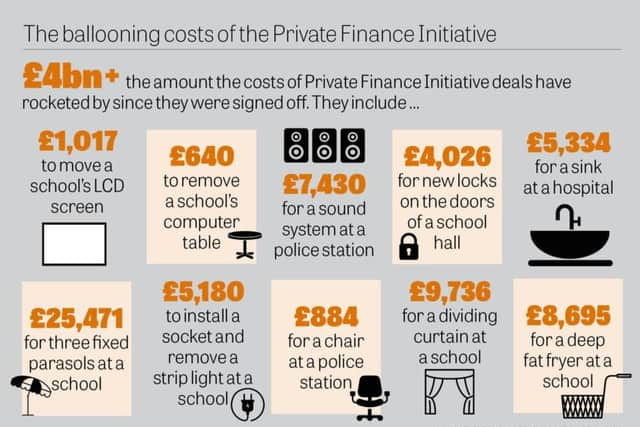Revealed: Scottish schools built under PFI costing millions more than originally estimated


A majority of the contracts signed off by councils with private firms in the late 1990s and early 2000s to replace crumbling buildings were pegged to the retail price index (RPI), a now discredited inflation measure typically used to calculate rail fare hikes and student loan interest payments.
The governor of the Bank of England, Mark Carney, has previously admitted there are “known errors” in the RPI system and last year called for the UK Government to stop issuing bonds linked to it.
Advertisement
Hide AdAdvertisement
Hide AdBut that advice has come too late for many local authorities north of the Border, which are now left shelling out millions more in costs for schools built under PFI.


The Scottish Government said the PFI approach used in the past had delivered poor value for money, leaving taxpayers in Scotland liable for a £30 billion legacy of payments between 1997 and 2042.
At least eight councils north of the Border remain locked in to long-term contracts pegged to RPI for school building work.
A wider investigation by The Scotsman and its sister titles has also uncovered that costs and rising inflation are set to add at least £4bn to the overall price tag of PFI schemes UK-wide, according to figures obtained from hundreds of public bodies.
One PFI contract pegged to RPI, signed off by South Lanarkshire Council to replace its schools estate, will end up costing taxpayers £61m more than first estimated due to inflation uplift.
The contract - which lasts 33 years - paid for each of the 19 secondary schools in the county to be rebuilt. A spokesman for the council said it was confident the deal remained value for money, and pointed to improved exam results at the new schools.
They added: “As is commonplace for contracts of these kinds, the PFI contract for modernisation of our secondary schools included provision for inflation.
“Inflation was a known part of the contract from the outset, and therefore there is no change to the consideration that the contract was value for money.”
Advertisement
Hide AdAdvertisement
Hide AdA separate deal agreed by neighbouring North Lanarkshire Council to rebuild schools will cost taxpayers £57m more than originally estimated.
A spokeswoman for the local authority said: “At the time of the contract agreement in 2005, this was the only funding mechanism available to build the scale and scope of capital investment for much-needed schools in our communities.
“The ongoing financial consequences of the school contract is factored into the council’s medium-term financial planning assumptions in the same way that we plan for future costs associated with other contracts with inflationary increases.”
Scottish Labour leader Richard Leonard has pledged to ban any further public-private finance deals if his party takes power at Holyrood.
“Scotland’s historical PFI deals have put unnecessary pressure on our NHS, our local government services and right across the public sector,” he told The Scotsman.
“That is why I have been clear that the Scottish Labour government that I lead will introduce a ban on new PFI deals.
”We will also take private contracts back in house at the earliest opportunity to save the taxpayer money in the long term.”
A Scottish Government spokeswoman said: “The annual PFI repayment bill now exceeds £1 billion – nearly five times more than the Non-Profit Distributing (NPD) programme which we introduced and is proving far better value to the public purse.
Advertisement
Hide AdAdvertisement
Hide Ad“The funding of public infrastructure has vastly improved since 2007. We are working to ensure PFI contracts which have been inherited provide the best value for money for the taxpayer – and to ensure savings are achieved from existing contracts, wherever possible.”
Analysis: Why PFI is so controversial
While they may look like any other hospital, school or police station, many public-sector buildings across the country are in fact owned and run by private companies.
The Private Finance Initiative (PFI) works in a similar way to a phone contract - authorities get their hands on shiny new buildings upfront and will usually get to own them outright at the end of their contracts.
The deals often last for 25 or 30 years, with payments also covering services such as cleaning and maintenance.
PFI began under John Major’s Conservatives in the early 1990s but proliferated during the New Labour years. It continued under the Tories before then-Chancellor Philip Hammond put a stop to it last year.
But when contracts were signed the cost of annual bills was often linked to the now-discredited Retail Price Index measure of inflation, meaning many annual payments have been rising steeply while public-sector budgets were being squeezed.
Megan Waugh, a postgraduate researcher at the University of Leeds who specialises in PFI, said the schemes had never offered taxpayers value for money.
“These are contracts which were forced onto a public sector desperate for infrastructure investment,” she said.
Advertisement
Hide AdAdvertisement
Hide Ad“They have never made sense financially, public sector borrowing would have been cheaper and instead councils and NHS trusts have been locked into increasingly expensive repayments over long-term inflexible contracts. “
And at every step of the process from design, construction and maintenance, quality and quantity of service provided has been reduced in order to maximise profit. Research on the first round of PFI hospital projects showed that bed numbers were reduced by almost a third.”
The UK Treasury said it was supporting health authorities to manage the costs of old PFI deals. A spokeswoman said: “As announced in last year’s Budget, we will no longer be using PFI and PF2 funding for new government projects.”